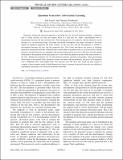Quantum Generative Adversarial Learning
Author(s)
Lloyd, Seth; Weedbrook, Christian
DownloadPhysRevLett.121.040502.pdf (157.2Kb)
PUBLISHER_POLICY
Publisher Policy
Article is made available in accordance with the publisher's policy and may be subject to US copyright law. Please refer to the publisher's site for terms of use.
Terms of use
Metadata
Show full item recordAbstract
Generative adversarial networks represent a powerful tool for classical machine learning: a generator tries to create statistics for data that mimics those of a true data set, while a discriminator tries to discriminate between the true and fake data. The learning process for generator and discriminator can be thought of as an adversarial game, and under reasonable assumptions, the game converges to the point where the generator generates the same statistics as the true data and the discriminator is unable to discriminate between the true and the generated data. This Letter introduces the notion of quantum generative adversarial networks, where the data consist either of quantum states or of classical data, and the generator and discriminator are equipped with quantum information processors. We show that the unique fixed point of the quantum adversarial game also occurs when the generator produces the same statistics as the data. Neither the generator nor the discriminator perform quantum tomography; linear programing drives them to the optimal. Since quantum systems are intrinsically probabilistic, the proof of the quantum case is different from—and simpler than—the classical case. We show that, when the data consist of samples of measurements made on high-dimensional spaces, quantum adversarial networks may exhibit an exponential advantage over classical adversarial networks.
Date issued
2018-07Department
Massachusetts Institute of Technology. Department of Mechanical EngineeringJournal
Physical Review Letters
Publisher
American Physical Society
Citation
Lloyd, Seth and Christian Weedbrook. "Quantum Generative Adversarial Learning." Physical Review Letters 121, 4 (July 2018): 040502 © 2018 American Physical Society
Version: Final published version
ISSN
0031-9007
1079-7114